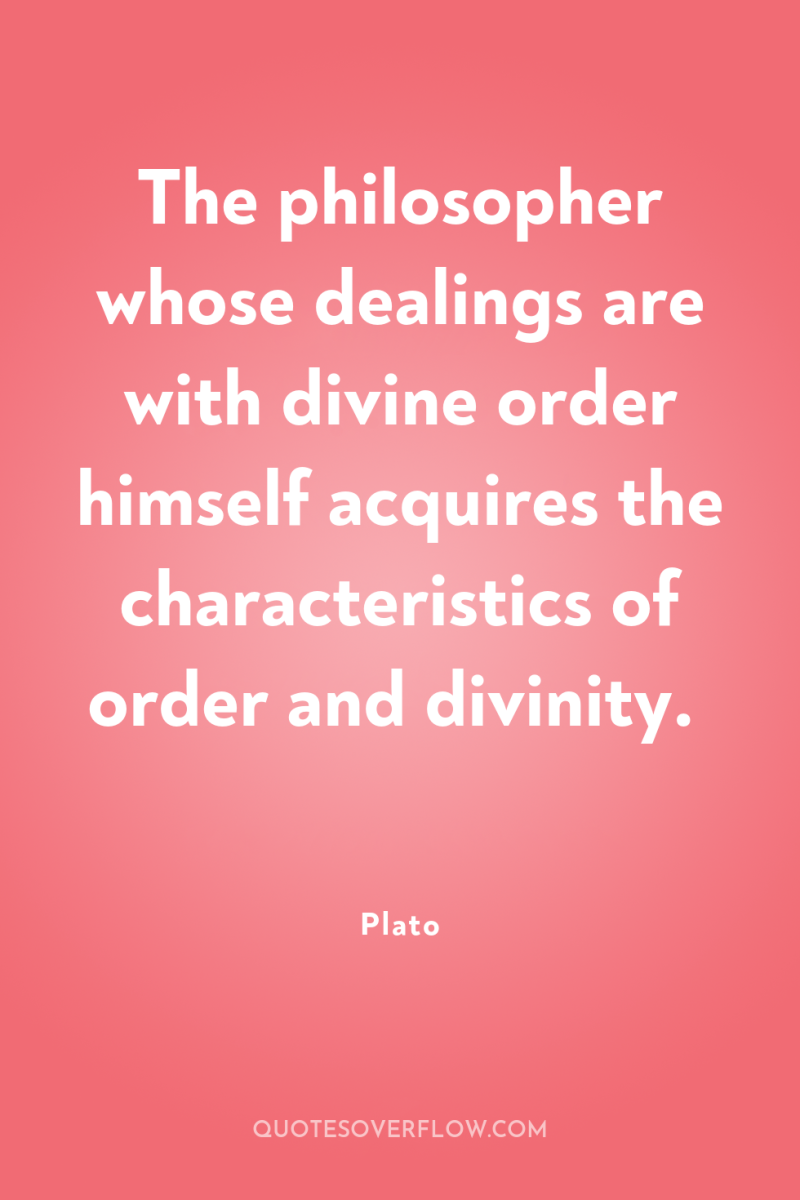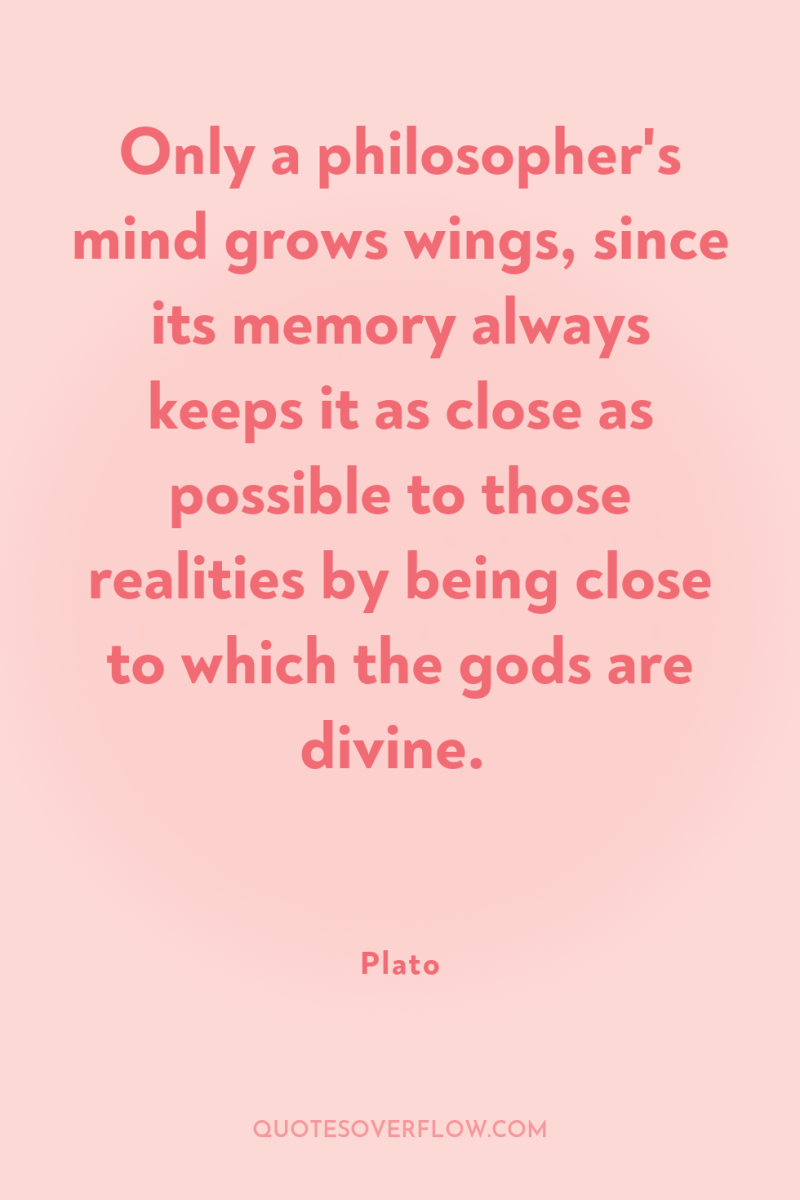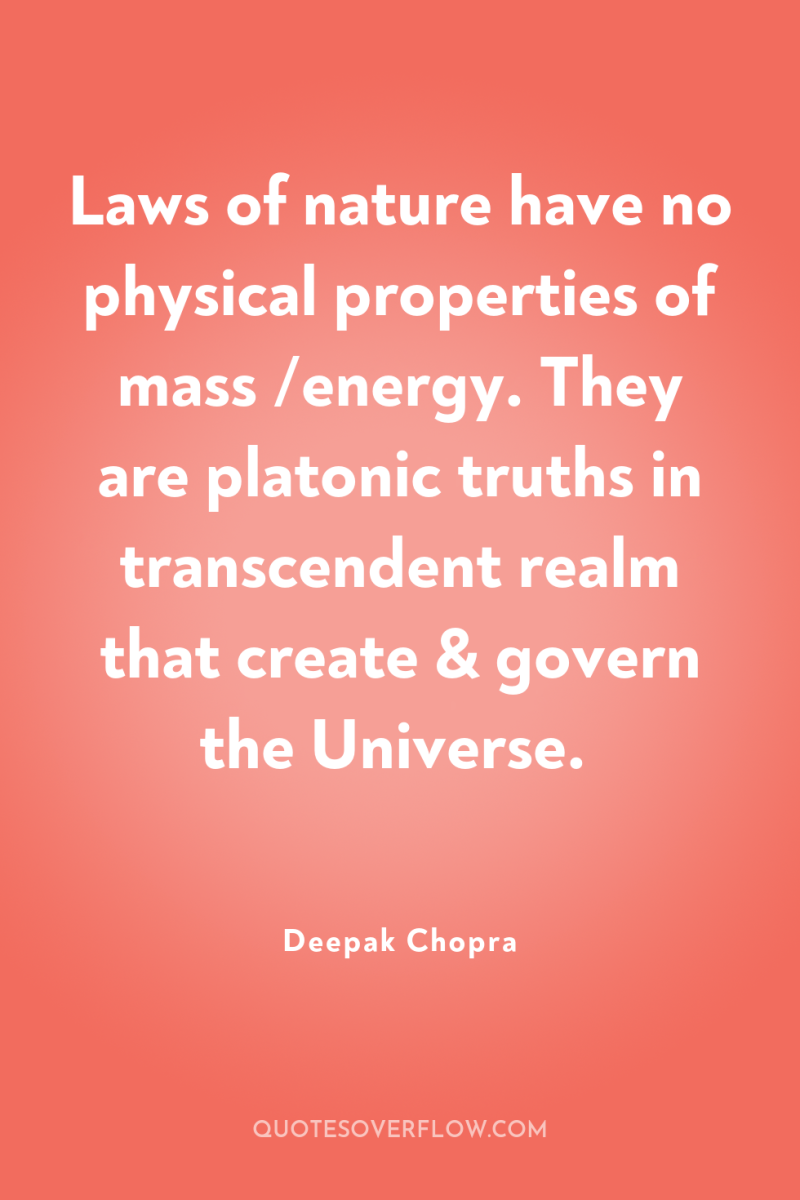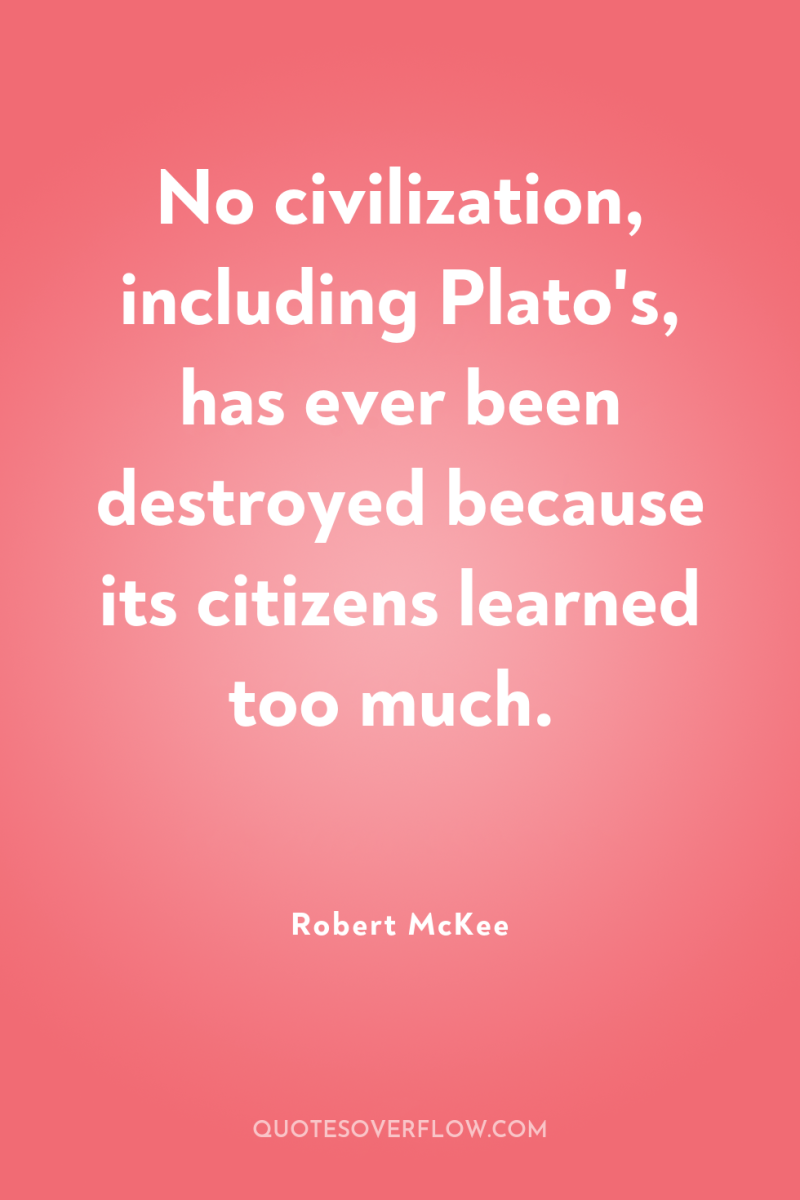
1
Plato says that the unexamined life is not worth living. But what if the examined life turns out to be a clunker as well?Kurt Vonnegut Jr.
2
I hope it is not necessary for me to stress the platonic nature of our relationship- not platonic in the purest sense, there was no philosophical discourse, but we certainly didn't fuck, which is usually what people mean by platonic; which I bet would really piss Plato off, that for all his thinking and chatting his name has become an adjective for describing sexless trysts.Russell Brand
3
Socrates: Have you noticed on our journey how often the citizens of this new land remind each other it is a free country? Plato: I have, and think it odd they do this. Socrates: How so, Plato?Plato: It is like reminding a baker he is a baker, or a sculptor he is asculptor. Socrates: You mean to say if someone is convinced of their trade, they haveno need to be reminded. Plato: That is correct. Socrates: I agree. If these citizens were convinced of their freedom, they would not need reminders.E.a. Bucchianeri

4
The philosopher whose dealings are with divine order himself acquires the characteristics of order and divinity.Plato

5
Only a philosopher's mind grows wings, since its memory always keeps it as close as possible to those realities by being close to which the gods are divine.Plato

6
An over examination of life can deter you from life itselfIlyas Kassam
![[O]ther thinkers have philosophised since the time of Plato, but...](https://cdn.quotesoverflow.com/file/quotesoverflow/images/other-thinkers-have-philosophised-since-the356464524638-1200.webp)
7
[O]ther thinkers have philosophised since the time of Plato, but that does not destroy the interest and beauty of his philosophyFrederick Charles Copleston
8
Manlius. . took care in his invitations, actively sought to exclude from his circle crude and vulgar men like Caius Valerius. But they were all around; it was Manlius who lived in a dream world, and his bubble of civility was becoming smaller and smaller. Caius Valerius, powerful member of a powerful family, had never even heard of Plato. A hundred, even fifty years before, such an absurdity would have been inconceivable. Now it was surprising if such a man did know anything of philosophy, and even if it was explained, he would not wish to understand.Iain Pears

9
Laws of nature have no physical properties of mass /energy. They are platonic truths in transcendent realm that create & govern the Universe.Deepak Chopra
10
No mi kršćani upućeni smo po srediÅ¡tu naÅ¡ega Creda - 'muÄen pod Poncijem Pilatom' - u povijest u kojoj je bilo razapinjanja i muÄenja, u kojoj se plakalo i tako rijetko ljubilo. I nikakav od povijesti udaljeni mit, nikakav Platonovi idejni Bog, nikakva gnostiÄka soteriologija i nikakav apstraktni govor o povijesnosti naÅ¡e egzistencije ne mogu nam vratiti onu nedužnost koju smo u toj povijesti izgubili.Johann Baptist Metz
11
I thought to myself: I am wiser than this man; neither of us probably knows anything that is really good, but he thinks he has knowledge, when he has not, while I, having no knowledge, do not think I have.Plato
12
For to fear death, my friends, is only to think ourselves wise without really being wise, for it is to think that we know what we do not know. For no one knows whether death may not be the greatest good that can happen to man.Plato

13
A poet, you see, is a light thing, and winged and holy, and cannot compose before he gets inspiration and loses control of his senses and his reason has deserted him.Plato

14
No civilization, including Plato's, has ever been destroyed because its citizens learned too much.Robert McKee

15
The most effective kind of education is that a child should play amongst lovely things.Plato
16
The direction in which education starts a man will determine his future lifePlato

17
Plato and Aristotle are my teachers. Even Kant is my teacher, but my greatest teacher is my failures.Debasish Mridha
18
Socrates is a shining example of a man who bravely lived up to his ideals, and, in the end, bravely died for them. Throughout his life, he never lost faith in the mind’s ability to discern and decide, and so to apprehend and master reality. Nor did he ever betray truth and integrity for a pitiable life of self-deception and semi-consciousness. In seeking relentlessly to align mind with matter and thought with fact, he remained faithful both to himself and to the world, with the result that he is still alive in this sentence and millions of others that have been written about him. More than a great philosopher, Socrates was the living embodiment of the dream that philosophy might one day set us free.Neel Burton

19
Beauty, like an animal, doesn’t always behave.Eva Brann
20
Fusing the doctrines of Plotinus and Proclus with the creeds and beliefs of Christianity, Dionysius the Pseudo-Areopagite combined the Neo-Platonic conviction of the fundamental oneness and luminous aliveness of the world with the Christian dogmas of the triune God, original sin and redemption. The universe is created, animated and unified by the perpetual self-realization of what Plotinus had called "the One, " what the Bible had called "the Lord, " and what he calls "the superessential Light.Erwin Panofsky
21
Plato's proposals in this matter are abhorrent to all true Christians. His intentions were, of course, excellent, for he desired the greatest possible improvement of the human race; but his good intentions led him to the proposal of measures which are necessarily unacceptable and repugnant to all those who adhere to Christian principles concerning the value of the human personality and the sanctity of human life. Moreover, it by no means follows that what has been found successful in the breeding of animals, will also prove successful when applied to the human race, for man has a rational soul which is not intrinsically dependent on matter but is directly created by Almighty God. Does a beautiful soul always go with a beautiful body or a good character with a strong body? Again, if such measures were successful – and what does "successful" mean in this connection? – in the case of the human race, it does not follow that the Government has the right to apply such measures. Those who to-day follow, or would like to follow, in the footsteps of Plato, advocating, e.g. compulsory sterilisation of the unfit, have not, be it remembered, Plato's excuse, that he lied at a period anterior to the presentation of the Christian ideals and principles. – 230.Frederick Charles Copleston
22
... when someone sees a soul disturbed and unable to see something, he won't laugh mindlessly, but he'll take into consideration whether it has come from a brighter life and is dimmed through not having yet become accustomed to the dark or whether it has come from greater ignorance into greater light and is dazzled by the increased brillance.Plato
23
Your friend Plato holds that commonwealths will only be happy when either philosophers rule or rulers philosophize: how remote happiness must appear when philosophers won't even deign to share their thoughts with kings.Thomas More
24
Plato said that we are trapped inside a cave and know the world only through the shadows it casts on the wall. The skull is our cave, and mental representations are the shadows.Steven Pinker
25
The reason is that they utter these words of theirs not by virtue of a skill, but by a divine power - otherwise, if they knew how to speak well on one topic thanks to a skill, they would know how to speak about every other topic too.Plato
26
If the ancients had been able to see it as I see it now, Mr. Palomar thinks, they would have thought they had projected their gaze into the heaven of Plato's ideas, or in the immaterial space of the postulates of Euclid; but instead, thanks to some misdirection or other, this sight has been granted to me, who fear it is too beautiful to be true, too gratifying to my imaginary universe to belong to the real world. But perhaps it is this same distrust of our senses that prevents us from feeling comfortable in the universe. Perhaps the first rule I must impose on myself is this: stick to what I see. .Italo Calvino
27
As architect of choosing..choose. to. live.awakened. entirely. wholly.wildly powerful,  deeply masterful,  authentically creative, thriving. this is not a hoped-for possible self.[reminder: this is an immutable Law of your being]needing not to learn the skill of being whole,  the antidote is to unlearn the habit of living incompletelyhere’s the practice:‘know thyself‘–its about spirit righteousness is underratedelevate connection with the changeless essenceseek similitude with the will of Source and will of self'choose thyself'–its about substancesacred. sagacious. spacious.in thought, word and deed–intend to: honor virtue. innovate enthusiastically. master integrity.'become who you are'–its about style a human,  being an entrepreneur of life experiencesa human,  being a purveyor of preferencesbeing-well with the known experience of soul, in serviceyour relationship with insecurities, contradictions, & failures?obstacles or..invitations to grow?[mindset forms manifestation]emotions are messengers are giftsdata for discernment: dare to deconstruct them your fearsa belief renovation: fear.less. & aspire towards ascendance, anywaysupport your shinelean into the Lightbe.come.incandescentas architect of choosing,  I choose.. to disrupt the energy of the status quo, to eclipse the realms of ordinary, & to live--a life-well lived.w/ spirit, substance & style.LaShaun Middlebrooks Collier
28
The resurrection of the body - what do we really mean by this? ..Did not the mystics and sages of all times teach us that the positive meaning of death is precisely that it liberates us from the prison of the body, as they say, from this perennial dependency on the material, physical, and bodily life - finally rendering our souls light, weightless, free, spiritual? We [must] consider more profoundly the meaning of the body.. We must consider the role of the body in our, in my, life. On the one hand, of course it is entirely clear that all of our bodies are transitory and impermanent. Biologists have calculated that all the cells that compose our bodies are replaced every seven years. Thus, physiologically, every seven years we have a new body. Therefore, at the end of my life the body that is laid in the grave or consumed by fire is no longer the same body as all the preceding ones, and in the final analysis each of our bodies is nothing other than our individual [being] in the world, as the form of my dependence on the world, on the one hand, and of my life and of my activity on the other. In essence, my body is my relationship to the world, to others; it is my life as communion and as mutual relationship. Without exception, everything in the body, in the human organism, is created for this relationship, for this communion, for this coming out of oneself. It is not an accident, of course, that love, the highest form of communion, finds its incarnation in the body; the body is that which sees, hears, feels, and thereby leads me out of the isolation of my *I*. But then, perhaps, we can say in response: the body is not the darkness of the soul, but rather the body is its freedom, for the body is the soul as love, the soul as communion, the soul as life, the soul as movement. And this is why, when the soul loses the body, when it is separated from the body, it loses life.Alexander Schmemann
29
The Muse herself makes some men inspired, from whom a chain of other men is strung out who catch their own inspiration from theirs.Plato
30
Wealth does not bring about excellence, but excellence makes wealth and everything else good for men, both individually and collectively.Socrates
31
There is nothing which for my part I like better, Cephalus, than conversing with aged men; for I regard them as travellers who have gone a journey which I too may have to go, and of whom I ought to inquire, whether the way is smooth and easy, or rugged and difficult.Plato
32
Most beauty lies in the LIES of the beholder!Ashok Kallarakkal
33
Many have rehashed the great works of Plato, and coming forward to the 20th century even Napoleon Hill gave us rehashed woo-woo when he replicated Wallace D. Wattles.Stephen Richards
34
There are two things a person should never be angry at, what they can help, and what they cannot.Plato
35
As it is, the lover of inquiry must follow his beloved wherever it may lead him.Plato
36
Valuing names as they do, Realists are sparing with them. They are likely to be known only as Joe or Bill or Plato. And they don't smile much. Nominalists have more fun. They are known as Aristotle or Decimus-et-Ultimus Barziza, or as Edward John Barrington Douglas-Scott-Montague, or perhaps by one name in childhood and several others in the course of life. A firm Realist misses out on one of the most satisfying of all human activities -- the assumption of secret identities. A man who has lived and never been someone else has never lived. It is true that occasionally there can be embarrassment in secret identities, but only a Realist will take the whole thing seriously enough to hit you. So have your fun, and avoid Realists.Alexei Panshin
37
Plato argued that good people do not need laws to tell them to act responsibly, while bad people will always find a way around law. By pretending that procedure will get rid of corruption, we have succeeded only in humiliating honest people and provided a cover of darkness and complexity for the bad people. There is a scandal here, but it's not the result of venal bureaucrats. (1994) p. 99Philip K. Howard
38
..in the running of cities, virtually nothing is done by anyone that is conducive to political health, nor is there a single ally with whom one might go to the aid of justice and still remain alive; it would be a case of a solitary human among wild animals, neither wanting to join in their depredations nor able to stand alone against their collective savagery, dead before he'd done any good to his city or friends and useless both to himself and everybody else. Once a person has made all these calculations, he keeps his peace and minds his own business, like someone withdrawing from the prevailing wind into the shelter of a wall in a storm of dust or rain, and as he sees everyone else filling themselves full of lawlessness he is content if he himself can somehow live out life here untainted by injustice and impious actions, and leave it with fine hopes and in a spirit of kindness and good will.Plato
39
We've heard many people say and have often said ourselves that justice is doing one's own work and not meddling with what isn't one's own ... Then, it turns out that this doing one's own work-provided that it comes to be in a certain way-is justice.Plato
40
Plato forbids children wine till eighteen years of age, and to get drunk till forty; but, after forty, gives them leave to please themselves, and to mix a little liberally in their feasts the influence of Dionysos, that good deity who restores to younger men their gaiety and to old men their youth..fit to inspire old men with mettle to divert themselves in dancing and music; things of great use, and that they dare not attempt when sober.Michel De Montaigne
41
Diogenes, filthily attired, paced across the splendid carpets in Plato's dwelling. Thus, said he, do I trample on the pride of Plato. Yes, Plato replied, but only with another kind of pride.Georg Christoph Lichtenberg
42
Like Solon, Plato intended to write a long fable about legendary Atlantis; like Solon, he never did write it. Yet there existed beyond the Atlantic an unvisited land, after all, and it is more strange than any of Plato's myths that Plato's apprehension of order and justice should be a living influence among the people of that land, twenty-four centuries after the mystical philosopher's soul departed from Athens.Russell Kirk
43
How much more reasonable is it to say with the sage Plato, that the perfect happiness of a state consists in the subjects obeying their prince, the prince obeying the laws, and the laws being equitable and always directed to the good of the public?JeanJacques Rousseau
44
Men are not born equal in themselves, so I think it beneath a man to postulate that they are. If I thought myself as good as Sokrates I should be a fool; and if, not really believing it, I asked you to make me happy by assuring me of it, you would rightly despise me. So why should I insult my fellow-citizens by treating them as fools and cowards? A man who thinks himself as good as everyone else will be at no pains to grow better. On the other hand, I might think myself as good as Sokrates, and even persuade other fools to agree with me; but under a democracy, Sokrates is there in the Agora to prove me wrong. I want a city where I can find my equals and respect my betters, whoever they are; and where no one can tell me to swallow a lie because it is expedient, or some other man's will.Mary Renault
45
[On Socrates] My decision to prove reincarnation to the sophomoric cavemen of Athens, quite possibly, was the best decision I made for both myself and humanity. Another dominant behavioral trait is displayed by my efforts to perform selfish acts selflessly, which is significantly unique because the majority of people perform selfless acts selfishly. In the former modus operandi the virtue is preserved through the honesty of being selfish, but in the latter the virtue is corrupted by the dishonesty since the intent is disguised to appear virtuous. Therefore, people are the most evil when performing selfish acts selfishly, and would therefore be the most benevolent when performing selfless acts selflessly. To performs acts selfishly for the mere sake of acting, is irresponsible and destructive and to perform acts selflessly for the sake of acting, is reckless and self-destructive. The interesting dynamic of this newest revelation is how Aristotle knew, innately, to seek out Plato upon his father's death. Once Socrates reunited with Plato, as Aristotle, they proved metaphysics; except the trial of Socrates was so traumatizing they made the decision not to make it known. Instead they channeled the knowledge constructively ("selfishly"- because self-preservation is ultimately selfish) which was done selflessly by cultivating it through education. They were so successful, that the King of Macedonia (my father's previous employer) made a formal request ordering me to tutor his son, Alexander. That's interesting because I have memory of Alexander the Great. He was a passionate boy with incredible sex drive that was equal to that of a honey badger's virulence. He allowed his power to intoxicate him and I was the only one he trusted, and when I made the attempt to slow him down by reminding of of the all powerful mighty God, something happened that caused his death and some Athenian imbecile (probably out of guilt) tried to hang me up on a cross for being a traitor. I got the hell of out doge like a bat of hell the minute that fool said something about me not "honoring" the "gods" - I may have even said something to the effect of 'I am God.' Although, the quote that did survive was when I refused to allow Athens to commit the same crime twice prior to fleeing the city to seek sanctuary at a family's estate. .Alejandro C. Estrada
46
Plato utterly condemns the poets for publishing trivial, false and indeed wicked stories about the gods, such as that they fight with each other, or are overcome by emotions like grief, anger, mirth. Reluctantly, he will not allow Homer in his Republic, and he is very angry with the tragic poets for spreading unworthy ideas of the Deity.It may well be that there were inferior tragic poets who deserved Plato's strictures, but so far as concerns the tragic poets whom we know, Plato's attack is absurd. It is the attack of a severely intellectual philosopher who was also more of a poet than most poets have contrived to be; one who invented some of the profoundest and most beautiful of Greek myths. 'There is a long-standing quarrel', says Plato, 'between philosophy and poetry.' So there was, on the part of the philosophers, and most of all in Plato's own soul. .H.D.F. Kitto
47
Plato in both the Gorgias and the Republic looked back to Socrates and asserted that "it is better to suffer tortures on the rack than to have a soul burdened with the guilt of doing evil." Aristotle does not confront this position directly: he merely emphasizes that it is better still both to be free from having done evil and to be free from being tortured on the rack.Alasdair MacIntyre
48
To call the Form [of the Good] eternal is misleading: that something lasts forever does not render it any the better, any more than long-enduring whiteness is whiter than ephemeral whiteness.Alasdair MacIntyre
49
Ever since Plato most philosophers have considered it part of their business to produce ‘proofs’ of immortality and the existence of God. They have found fault with the proofs of their predecessors – Saint Thomas rejected Saint Anselm's proofs, and Kant rejected Descartes' – but they have supplied new ones of their own. In order to make their proofs seem valid, they have had to falsify logic, to make mathematics mystical, and to pretend that deepseated prejudices were heaven-sent intuitions.Bertrand Russell
50
My cough is much worse at night and often prevents me from sleeping. It is not so much the daytime tiredness that I resent, but the inability to proceed uninter- rupted with my dreams, to run and play with my fancies, and, at last, in the early hours of the morning, to be visited with visions like a holy madman. The dreamer is like a Delian diver, fishing for pearls from the depths of our inner sea of knowledge; and I must have solved, or rather resolved, many more problems in my sleep than in my conscious hours.Neel Burton
51
For once touched by love, everyone becomes a poetPlato
52
The Golden Proportion, sometimes called the Divine Proportion, has come down to us from the beginning of creation. The harmony of this ancient proportion, built into the very structure of creation, can be unlocked with the 'key' ... 528, opening to us its marvelous beauty. Plato called it the most binding of all mathematical relations, and the key to the physics of the cosmos.Bonnie Gaunt
53
In Euclid's Elements we meet the concept which later plays a significant role in the development of science. The concept is called the "division of a line in extreme and mean ratio" (DEMR)..the concept occurs in two forms. The first is formulated in Proposition 11 of Book II..why did Euclid introduce different forms.. which we can find in Books II, VI and XIII? ..Only three types of regular polygons can be faces of the Platonic solids: the equilateral triangle.. the square.. and the regular pentagon. In order to construct the Platonic solids.. we must build the two-dimensional faces.. It is for this purpose that Euclid introduced the golden ratio.. (Proposition II.11).. By using the "golden" isosceles triangle..we can construct the regular pentagon.. Then only one step remains to construct the dodecahedron.. which for Plato is one of the most important regular polyhedra symbolizing the universal harmony in his cosmology. .Alexey Stakhov
54
Philosophy is a bitter medicine with many fearsome side effects, but if you are able to stomach it, it can cure your soul of the many ills and infirmities of ignorance. Given the choice, most men prefer not to take it, and many of those who do soon find that they cannot carry on with it. In the end, they choose what is more pleasant over what is more wholesome, and prefer the society of those who encourage them in their follies to that of those who admonish and improve them. You, on the other hand, appear to be minded otherwise, for when a young men sets for himself the highest standards of education and conduct, he naturally shuns the company of mindless nobodies and boldly seeks out that of the singular men who are prepared to teach him and challenge him and exhort him to virtue. In time, by his strivings, he will come to realize that it is from the hardest toil and noblest deeds that the purest and most persisting pleasures are to be had, and, taking pity on other men, and thinking also of the gods, he will do everything in his power to share this precious secret.Neel Burton
55
Nothing has been as instructive in exploring the notion of authenticity as relearning the work of the great philosophers Aristotle and Plato. We are struck by their applicability to our work as we help companies and people develop their brands. Why do these early philosophers have so much to say that is helpful to modern marketers? We believe it is because they were focused on the fundamental issues of authenticity that we all face: Who are we? Why are we? How should we behave? Asking these questions encourages us to deepen our self-awareness. In particular, this issue of “who are we?” is critical. Knowing who we are is the key to elevating our capacities and performance.Tom Hayes
56
The matter is as it is in all other cases: if it is naturally in you to be a good orator, a notable orator you will be when you have acquired knowledge and practice ...Plato
57
And, believe me, if I were again beginning my studies, I should follow the advice of Plato and start with mathematics.Galileo Galilei
58
Every heart sings a song, incomplete, until another heart whispers back."- PlatoJessica Clare
59
Plato claimed that we were all joined to someone else once, we were humans with four arms and four legs, and a head of two faces, but we were so powerful we threatened to topple the Gods. So they split us from our sole mates down the middle, and doomed us to live forever without our counterpartsSarah Crossan
60
Do you know, when I am with you I am not afraid at all. It is a magic altogether curious that happens inside the heart. I wish I could take it with me when I leave. It is sad, my Grey. We are constrained by the rules of this Game we play. There is not one little place under those rules for me to be with you happily. Or apart happily, which is what makes it so unfair. I have discovered a curious fact about myself. An hour ago I was sure you were dead, and it hurt very much. Now you are alive, and it is only that I must leave you, and I find that even more painful. That is not at all logical. Do you know the Symposium, Grey? The Symposium of Plato. [He] says that lovers are like two parts of an egg that fit together perfectly. Each half is made for the other, the single match to it. We are incomplete alone. Together, we are whole. All men are seeking that other half of themselves. Do you remember? I think you are the other half of me. It was a great mix-up in heaven. A scandal. For you there was meant to be a pretty English schoolgirl in the city of Bath and for me some fine Italian pastry cook in Palermo. But the cradles were switched somehow, and it all ended up like this…of an impossibility beyond words. I wish I had never met you. And in all my life I will not forget lying beside you, body to body, and wanting you.Joanna Bourne
61
I am the wisest man alive, for I know one thing, and that is that I know nothing.Plato
62
In science there is and will remain a Platonic element which could not be taken away without ruining it. Among the infinite diversity of singular phenomena science can only look for invariants.Jacques Monod
63
My metaphysical thinking is more in alignment with Plato rather than Aristotle's." ~R. Alan Woods [2013]R. Alan Woods
64
Plato is dear to me, but dearer still is truth.Aristotle